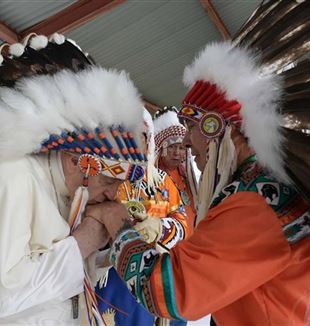
What builds history?
"To understand we have to look where there is something truly new." John Zucchi recounts how the Pope's "penitential pilgrimage" among the indigenous communities has provoked him. Their pain, and the "encounter".There are times when it becomes evident that history, our understanding of what marks our past and therefore our present, is outside our hands. We may look to the way in which power deals with problems: this morning for example the headlines referred to the continuing war in Ukraine and the devastating news of four political executions in Myanmar. We see so much evil around us and wonder if there is any way out, and at the same time we think that history somehow is built up by the power that so often perpetrates this evil. But if we want to understand what truly builds history, we have to look where there is something truly new, and this often means looking to the peripheries, among the downtrodden and forgotten.
In late March when representatives from Canada's Indigenous communities met Pope Francis in the Vatican, Chief Marie-Anne Day Walker-Pelletier, of the Okanese First Nation in Saskatchewan, gave the Holy Father two pairs of children's moccasins, which represented the many children who had entered Canada's residential schools and never made it home again. The downtrodden. The understanding was that the pontiff would return these moccasins when he came to Canada to deliver an apology.
On July 25, Pope Francis began his “penitential pilgrimage”, as he has called it, encountering a couple of thousand survivors of those institutions, and others, at the Muskwa Park . He asked for forgiveness again and again, referring to how Christians “supported the colonizing mentality of the powers that oppressed the Indigenous peoples.” He begged forgiveness “with shame and unambiguously…for the evil committed by so many Christians.” And he referred to the moccasins, stating how they had kept alive a deep sorrow in him in the ensuing period.
It was deeply moving to see what we can only describe as an encounter between the residential school survivors and the Pope. It was not a meeting, but an encounter, with all the weight the word carries. Both the Holy Father and the Indigenous people present were, as it were drawn out of themselves by something new, beyond them, unexpected. Many First Nations People, Inuit and Métis, were hoping for an apology from the pontiff but were not sure to have one. Others felt that even if there were an apology it might not be enough. What was striking was that all our hopes, expectations or demands were almost swept aside by the event itself People were visibly moved to tears. One Cree woman spontaneously began singing the Canadian national anthem in Cree in a very emotional way with tears streaming down her cheeks. Even the Pontiff stopped to listen to her and applauded.
The encounter in Muskwa Park was a very sombre moment. There was none of the cheering that so often accompanies papal visits. Pope Francis smiled gently as he greeted people on stage, but otherwise he set the tone with a gravely serious look on his face. This was a penitential pilgrimage after all, and so dignitaries and politicians respected the gesture. This was not a moment for their photo opportunities with the Pope nor to excitedly catch a glimpse of him, as so often happens (understandably) during a papal visit. Rather, his demeanour invited everyone to join him in earnest entreaty for forgiveness from the indigenous peoples and from God.
As we awaited the Holy Father’s arrival in Canada, it seemed at times that justice for Indigenous persons would be impossible to achieve, and the hopes of reconciliation so dim. Yet, in that simple encounter in a field in the middle of Alberta, between a humble Pope asking for forgiveness of a couple of thousand likewise humble, Indigenous people and those whom they represented, there, at the margins, a new hope opened up. We can comment all we want and develop all sorts of points of view on where relations will move between the Church and Indigenous peoples, but before all that, we must come to terms with what happened in those two brief hours in Muskwa Park. The extraordinary event there bore out the Holy Father’s words that “ our own efforts are not enough. To achieve healing and reconciliation we need God's grace.”
And yes, he did bring back those moccasins.